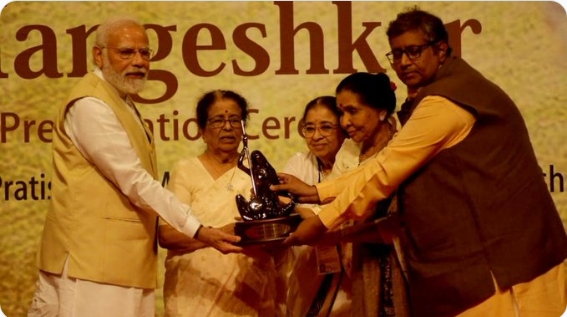[ad_1]
On Sunday, renowned playback singer Asha Bhosle regaled Prime Minister Narendra Modi and distinguished audiences with some whimsical, often tongue-in-cheek but lovely insights into her elder sister, the late Lata Mangeshkar’s life and times.
The occasion was the presentation of the country’s first ‘Lata Deenanath Mangeshkar Award’ to Modi, who sat in the front row of the audience, stood up to walk up onto the stage, and respectfully took the award from the country’s most famous musical family.
Later, the master of ceremonies, Harish Bhimani, disclosed how Lata Didi admitted that, while she looked to be the center of attention, her younger sister Asha was a formidable vocalist in her own right, and the doting apple of her father, Master Deenanath Mangeshkar’s eye.
The family gathered on this day (April 24) every year for the Master Deenanath Mangeshkar Awards celebration, and it was their beloved father’s 80th death anniversary, and even Lata Didi recently finished 80 years of a trailblazing singing career in the Indian cinema industry, Asha broke down.
“I never imagined a day would come when I’d have to stand here and speak about her like this,” Asha replied, brushing her tears away and regaining her composure swiftly.
Lata always used to say that drinking the water wiped from her parents’ feet was the greatest blessing, she claimed, recalling an occasion when she was barely 5 years old.
“To demonstrate her point, Lata Didi poured water on their feet, gathered some, drank it from her palms, and requested me to do the same while their parents slept at home.”
“The blessings of that experience – which may seem unreal – are still in our souls to this day. With cheers, Asha said, “That was the kind of parental commitment Lata Didi had and taught us.”
The five siblings – Lata, Asha, Usha, Meena, and brother Hridaynath – used to play ‘Gilli-danda’ and other sports on the streets of Kolhapur when they were kids, but Lata never wavered in her commitment to her job, which she began when she was barely in her teens.
“My sister had Saraswati in her voice, was very sharp with a mind like Chanakya, she could think long into the future, knew when to keep her mouth shut, and always used to chastise me for doing ‘broadband Barbados (chatter), and I used to dote her, always listen to her, and she knew well how to get what she wanted,” Asha smiled.
The phonograph firms used to just credit the film actors and actresses, not the playback singer who actually performed the songs, and Lata was troubled by the habit, but she remained silent, stating “this is not the proper time.”
Khemchand Prakash forced Lata to sing the timeless number “Aayega, Aayega Aanewala” for India’s first horror film, “Mahal” (1949), starring Ashok Kumar and Madhubala, while she was in her late teens.
The song was a smash hit, and Lata Didi had “arrived” in the film industry, according to Asha. She then sought credits under the name of “Lata Mangeshkar” on the song’s phonograph recordings.
“The aghast producer-directors were first opposed, but when she gently threatened to cease singing for them, they caved, gave her the credits, and that started the tradition of all singers being recognized for their abilities.”
Later, Lata insisted on the singers’ names appearing before the music directors’ names in the credits, to which they also bowed, afraid the sisters Lata-Asha would cease singing for them, even to a legend like Naushad Ali, who wrote memorable music for them “Mughal-E-Azam” and Baiju Bawraa
Lata, too, wrested ‘royalties’ for all the singers, alleging that the producers and music firms generated millions and crores of rupees from the artists for whom they paid a pittance of Rs 500-Rs 1,000, Asha recalled with a smile.
“When Lata Didi was invited to perform in London for the first time, she made it clear that she would only go if it was at the Royal Albert Hall.
(opened in 1871), but the organizers were outraged, saying, “It is not conceivable because it is just for whites.”
“When Lata Didi graciously but flatly refused to accommodate them, the organizers raced back to make it happen, and she finally sang at the legendary theatre in 1974, practically bringing the roof down with its vast 5,272 seating capacity,” and subsequently, I performed at the Royal Albert Hall.
“Lata Didi was very close to her family, including all of us sisters and brothers, because she had supported us since our father died in 1942. She was enamored with the surname ‘Mangeshkar,’ and used it as a formidable barrier to protect our interests “Asha went on to say.
Lata would often act harshly to chastise her siblings, grabbing their hair, and they, in turn, would yank her plaits (Choti), causing her to flee!
“Shevanti would chastise her to lessen her volume or she would grow hoary, and she would retaliate by shouting even louder,” Asha recalled of those golden days.
Lata Didi has been dedicated to her work since she was a teenager, and Asha recalled how, despite having a 104-degree fever, she insisted on going to a local theatre to perform her difficult role of a ‘fairy’ suspended from the ceiling, and that commitment lasted until the very end, evoking another round of applause.
[ad_2]

